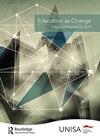Re/thinking Curriculum Inquiry in the Posthuman Condition: A Critical Posthumanist Stance
IF 1
4区 教育学
Q3 EDUCATION & EDUCATIONAL RESEARCH
引用次数: 3
Abstract
In the reconceptualisation era of curriculum studies, scholars drew on a range of theories such as existentialism, phenomenology, psychoanalysis, feminism, poststructuralism, and especially critical theory. They used critical theory as a lens to examine the influence of social and political forces on curriculum, in particular the role of dominant ideologies on schooling and higher education in capitalist societies. In this article we explore some of the limitations this has, especially with regard to the current posthuman condition, without repudiating all the benefits that it has offered. Then we re/think curriculum studies in the posthuman condition, drawing on insights from a particular strand of posthumanism, critical posthumanism. We experiment with the real, as well as with what a reconceptualised subject (one that is ecological) might mean for curriculum inquiry in South Africa. In our exploration, we re/think the curriculum concepts: curriculum-as-lived, curriculum as complicated conversation, and currere.反思后人类条件下的课程探究:一种批判的后人类主义立场
在课程研究的重新概念化时代,学者们借鉴了存在主义、现象学、精神分析、女权主义、后结构主义等一系列理论,尤其是批判理论。他们以批判理论为视角,考察了社会和政治力量对课程的影响,特别是资本主义社会中占主导地位的意识形态对学校教育和高等教育的作用。在这篇文章中,我们探讨了它的一些局限性,特别是在当前的后人类条件下,而没有否定它所提供的所有好处。然后,我们重新思考后人类条件下的课程研究,从一种特殊的后人类主义,批判性后人类主义中汲取见解。我们实验了真实的,以及一个重新概念化的学科(一个生态学科)对南非课程探究可能意味着什么。在我们的探索中,我们重新思考了课程的概念:作为生活的课程、作为复杂对话的课程和课程。
本文章由计算机程序翻译,如有差异,请以英文原文为准。
求助全文
约1分钟内获得全文
求助全文
来源期刊

Education As Change
EDUCATION & EDUCATIONAL RESEARCH-
CiteScore
1.40
自引率
0.00%
发文量
29
审稿时长
24 weeks
期刊介绍:
Education as Change is an accredited, peer reviewed scholarly online journal that publishes original articles reflecting critically on issues of equality in education and on the ways in which educational practices contribute to transformation in non-formal, formal and informal contexts. Critique, mainly understood in the tradition of critical pedagogies, is a constructive process which contributes towards a better world. Contributions from and about marginalised communities and from different knowledge traditions are encouraged. The articles could draw on any rigorous research methodology, as well as transdisciplinary approaches. Research of a very specialised or technical nature should be framed within relevant discourses. While specialised kinds of research are encouraged, authors are expected to write for a broader audience of educational researchers and practitioners without losing conceptual and theoretical depth and rigour. All sectors of education are covered in the journal. These include primary, secondary and tertiary education, adult education, worker education, educational policy and teacher education.
 求助内容:
求助内容: 应助结果提醒方式:
应助结果提醒方式:


